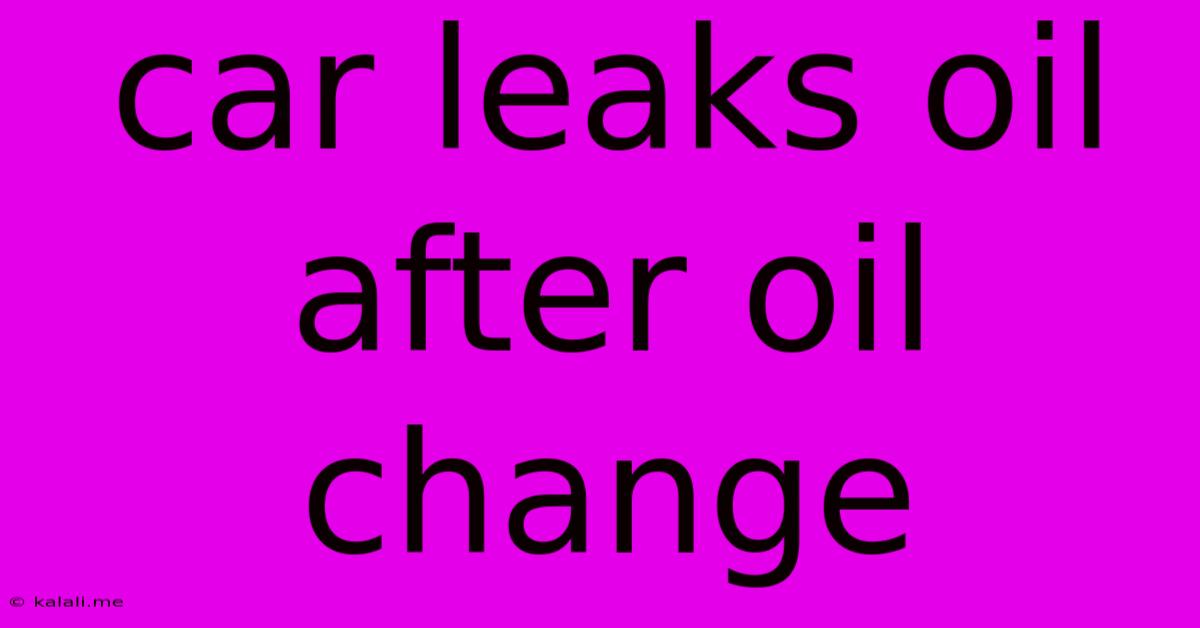Car Leaks Oil After Oil Change
Kalali
Jun 09, 2025 · 3 min read

Table of Contents
Car Leaks Oil After Oil Change: Causes and Solutions
Meta Description: Worried about oil leaks after your recent oil change? This guide explores common causes, from simple fixes like overfilling to more serious issues needing professional attention. Learn how to identify the problem and get your car back on the road safely.
Discovering an oil leak after an oil change is undeniably frustrating. It can range from a minor inconvenience to a serious mechanical problem. This comprehensive guide will help you understand the potential causes and offer solutions to get your car back in tip-top shape.
Common Causes of Oil Leaks After an Oil Change
Several factors contribute to post-oil change leaks. Identifying the source is crucial for effective repair.
-
Overfilling: This is often the simplest culprit. Adding too much oil increases pressure within the engine, forcing oil past seals and gaskets. Check your owner's manual for the correct oil level. Using the dipstick correctly is key—ensure the dipstick is fully inserted and wiped clean before checking.
-
Loose or Damaged Drain Plug: A poorly tightened drain plug is a major source of leaks. Ensure the plug is properly secured after the oil change. If the plug itself is damaged or stripped, it needs replacement.
-
Improperly Installed Oil Filter: A loose or improperly installed oil filter can lead to significant leaks. Make sure the filter is tightened according to the manufacturer's instructions. Avoid overtightening, which can damage the filter housing.
-
Faulty Oil Filter: A defective oil filter might have a manufacturing flaw, leading to leaks. While less common, it's important to consider if you’ve used a reputable brand. Using an incorrect oil filter for your car model can also cause problems.
-
Damaged Oil Pan Gasket: The oil pan gasket seals the oil pan to the engine block. If damaged or worn, it can leak oil. This usually requires professional attention and gasket replacement.
-
Cracked Oil Pan: A cracked oil pan is a more serious issue, possibly caused by impact damage. This needs professional repair, often involving welding or replacing the oil pan.
-
Worn Engine Seals: Leaks from seals around the engine's various components (e.g., crankshaft seal, valve cover gasket) are possible, especially in older vehicles. These are more involved repairs requiring professional expertise.
Diagnosing the Leak
Before tackling any repairs, carefully locate the source of the leak.
- Inspect the area around the drain plug: Look for fresh oil stains.
- Check the oil filter: Look for oil around the filter and its connection point.
- Examine the oil pan: Look for cracks or leaks around the gasket.
- Observe the engine block: Check for leaks from other areas, like the valve cover.
Take photos to document the location and extent of the leak, which will be helpful for a mechanic if professional help is needed.
Solutions and When to Seek Professional Help
For minor leaks, like those caused by overfilling or a loose drain plug, you can likely handle the repairs yourself. However, if the leak is significant, you’re unsure of the source, or you lack the necessary experience, it's crucial to consult a qualified mechanic. Ignoring oil leaks can lead to serious engine damage.
DIY Solutions (for minor leaks only):
- Check and adjust the oil level: Ensure the oil level is correct using the dipstick.
- Retighten the drain plug: Use the correct torque wrench to avoid stripping the threads.
- Reinstall the oil filter: Ensure it's properly tightened.
When to see a professional:
- Significant oil leaks: Large oil puddles under your car are a serious warning sign.
- Unidentifiable leak sources: If you can't pinpoint the source, a mechanic's expertise is necessary.
- Leaks from engine seals or the oil pan gasket: These repairs require specialized tools and knowledge.
- Cracked oil pan: This requires specialized repair, likely involving welding or replacement.
Regular car maintenance, including timely oil changes, is crucial for preventing leaks. Using high-quality oil and filters also contributes to a healthy engine and fewer potential issues. By understanding the common causes and recognizing when to seek professional help, you can address oil leaks effectively and keep your car running smoothly.
Latest Posts
Latest Posts
-
Do Electrons Move From High To Low Potential
Jun 09, 2025
-
How To Reset Garbage Disposal Without Button
Jun 09, 2025
-
Garage Door Light Flashes 5 Times
Jun 09, 2025
-
Which Disney Park Has The Most Rides
Jun 09, 2025
-
What Do Letter And Numbers On A Schematic Mean
Jun 09, 2025
Related Post
Thank you for visiting our website which covers about Car Leaks Oil After Oil Change . We hope the information provided has been useful to you. Feel free to contact us if you have any questions or need further assistance. See you next time and don't miss to bookmark.